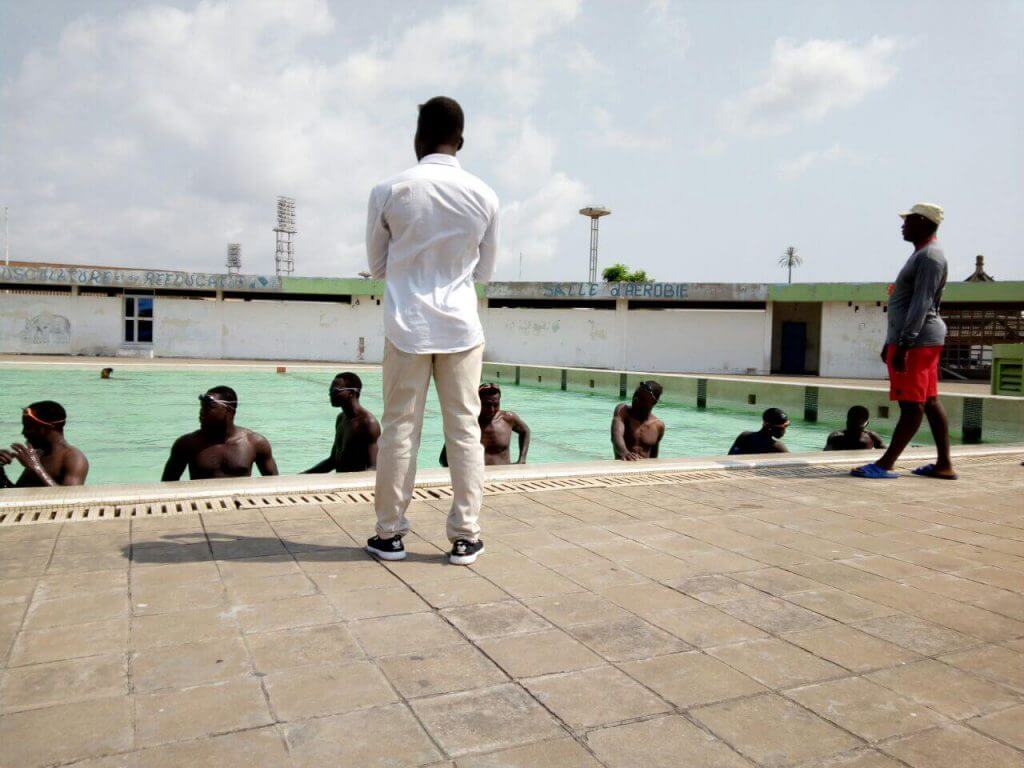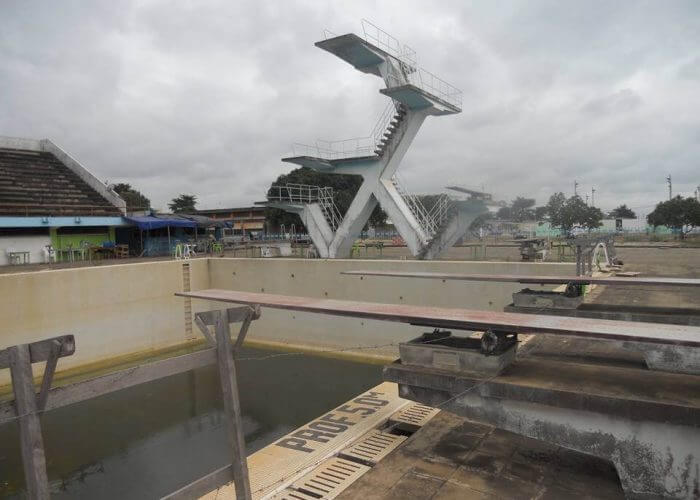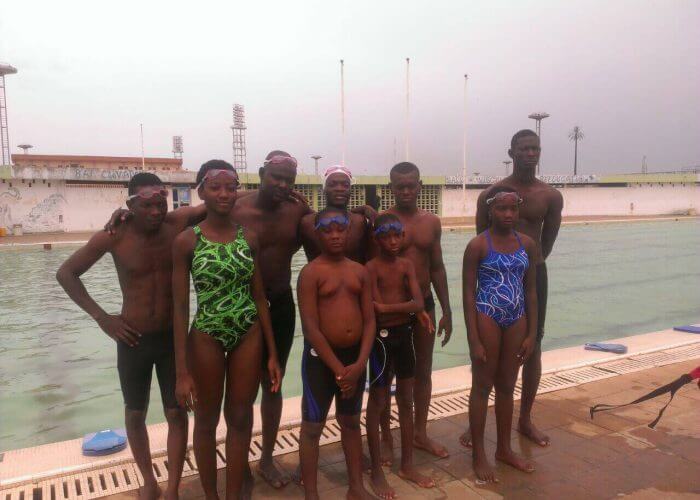When Swimmers Met in Africa: The Story of the Olympic Swim Complex at Friendship Stadium

As an English teacher living in the small West African country of Benin in 2015, I began looking around for a pool to swim at near my home. When someone told me there was a pool next to a local soccer stadium, I jumped on the back of a motorcycle taxi and 10 minutes later found myself looking at the walls of a gigantic, circular monstrosity. Stepping inside, I realized that someone in the past had taken swimming seriously in Benin.
The Olympic swim complex at the Stade de l’Amitie (Friendship Stadium) sits in the corner of a huge, open plaza off to the side of the soccer stadium and an indoor basketball arena. The Stade as they call the city block, is the center of recreation in Cotonou, the county’s largest city. Locals go there to rollerblade, dance, play music, or just to socialize. The Stade is comprised of two 50-meter lap pools and a diving well with a 10-meter board. Like a lot of public works projects in Benin, it was built by the Chinese in 1982. However, once the Chinese left, the local government didn’t have the funds to maintain it.

Photo Courtesy: Dan Airth
The current staff still hang on to the glory years and take advantage of the situation as much as possible. There is a muscular, shaven-headed man who takes the entrance fee of 1500 of the local currency (about 3 dollars) and wears a faded, blue polo shirt that says Benin Natacion on it. A few other younger men sit around the tables and drink the local beer, La Beninoise. They also give swim lessons for a negotiated price.
It has been a long time since the pool’s filtration system worked and the cleaning is done the old fashioned way; by getting in the pool and scrubbing the tiles by hand. Going there on days after a heavy rain is the best way to ensure good water quality. Nose plugs and goggles are recommended. Most locals shy away from the pool even though it’s 90 degrees everyday as they either they have never noticed it’s there or even they don’t want to swim in the murky water.
It would take about a million dollars to renovate the pool complex according to the shaven-headed man. That figure is to renovate all 3 pools as well as fix up the grandstands, the diving platform, and the numerous classrooms around the facility. Although there was not much use at the time for a 10-meter diving board in Benin, now it stands like a symbol of what could have been. There have been many stories about how someone was going to step up and give the Stade a second wind, but after 25 years but nothing has happened yet.
A sign of hope appeared in 2000 when Benin established the Beninese Swim Federation as the national governing body for the sport of swimming. The Federation promotes swimming in Benin as well as recently training Benin’s Olympic swimmers. The last few Olympics have seen Beninese swimmers compete in the 50-meter freestyle event also called the “splash and dash”. The 50-meter free is all about heart and fury even if technique is lacking. Most African countries have at least once swimmer entered in the event. Last year in Rio, Benin was lucky enough to send a man and woman.
The Federation’s swim club has recruited swimmers from all over Benin. Narcisse Alognisso, the club’s swim coach, is a constant presence at the pool. He walks the decks and leads his swimmers through drills 5 mornings a week. He not only serves as their coach and mentor, but also has taken some of the young recruits into his own home. He once told me the hardest part of recruiting young swimmers is to convince the swimmer’s parents about the importance of swimming.
His brother and the president of the Federation, Damien, remembers the heyday of the Stade. Regular all-city swim meets were held there and the grandstands surrounding the pool would be full. Nowadays, there are still occasional swim meets, but rough-hewn ropes serve as lane lines and many competitors don’t use goggles. There are always a few kids in the grandstands exploring the novelty of the dilapidated press box.

Photo Courtesy: Dan Airth
During my return visit last year and Damien asked me why I wanted to donate to the Federation. I told him my story of swimming in the pool every week when I used to live there. He has seen many foreigners swim at the Stade over the years but I guess I was the first person who wanted to help out. I told him by sending a swimmer to the Olympics, he is making the world a better place. He nods. When I tell him I hope that one day the club will produce a medal-winner, he laughs.
The societal changes that are coming in Benin don’t bode well for the Stade. Like all over Africa, more and more people are streaming into the cities and creating small gentrified areas with huge slums all around. African societies are becoming more stratified into the have and have-nots. I have a feeling that in the future, those few who can afford it will build their own pool, and surround it by high walls so that no one else can use it.
The author, Dan Airth, was born in Seal Beach, California and was a competitive swimmer. He returned Benin in April 2016 and donated 60 swimsuits and goggles to the Benin Swim Federation. Then he founded the non-profit Swim Benin to promote swimming and water safety in the West African country. Find out more information by visiting Dan’s website at www.helpbeninswim@weebly.com or visit his facebook page Swim Benin. You can also donate to the gofundme campaign Help Benin Swim.



